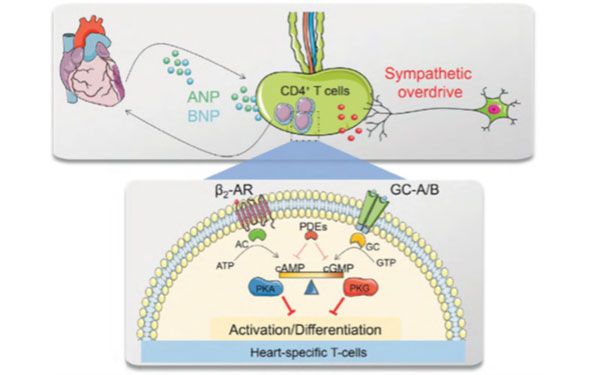
Neuroendocrine system modulation of T cell responses after myocardial infarction (B1)
Background
Recent studies from our group and others have shown that T cells activated after myocardial infarction are important mediators in proper myocardial healing. From the immune system’s point of view, the myocardial infarction creates a unique sterile milieu, characterized by high levels of catecholamines and natriuretic peptides production. However, it remains unclear how the neuroendocrine axis affects T cell responses and subsequently myocardial repair after infarction.
Rationale and aims
We hypothesize that neuroendocrine system regulates T cell responses towards a pro-healing phenotype. We will test this hypothesis by studying the effects of β-adrenergic and natriuretic peptide signalling on T cell functions and their contribution to cardiac inflammation and healing after infarction.
Approach
We will use genetic models aligned to cell transfer experiments to address the role of β2-adrenergic, GC-A natriuretic peptide receptors and Pde2a, an enzyme that controls both pathways, in T cell responses after myocardial infarction. Those responses will be characterized by complementarily high-end multi-colour light-sheet fluorescence microscopy, flow cytometry , cAMP/cGMP FRET analysis and single-cell sequencing. In addition, cardiac function will be monitored by 4-chamber echocardiography and magnetic resonance imaging.

Significance and outlook
We expect that this approach will enable us to better understand T cell responses after myocardial infarction and unveil new targets for immune system’s intervention in cardiovascular diseases.
Anschrift
Medizinische Klinik und Poliklinik I, Universitätsklinikum Würzburg, Zentrum für Innere Medizin (ZIM), Oberdürrbacher Straße 6, Haus A3, 97080 Würzburg, Deutschland
Deutsches Zentrum für Herzinsuffizienz Würzburg | Comprehensive Heart Failure Center | Am Schwarzenberg 15 | Haus A15 | 97078 Würzburg



